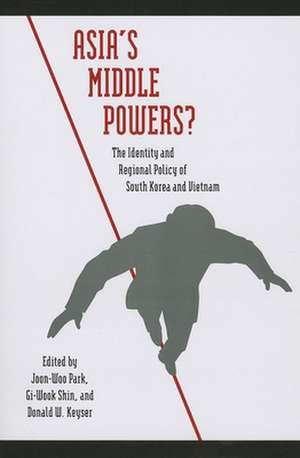Asia's Middle Powers?: The Identity and Regional Policy of South Korea and Vietnam
Editat de Joon-Woo Park, Don Keyser, Gi-Wook Shinen Limba Engleză Paperback – 19 sep 2013
South Korea and Vietnam established diplomatic relations only twenty years ago. Today these former adversaries enjoy unexpectedly cordial and rapidly expanding bilateral ties. Leaders of the two nations—perceiving broadly shared interests and no fundamental conflicts—seek to leverage their subregional influence on behalf of common or complementary policy goals. Today they often profess a "middle power" identity as they explain their foreign policy in terms of such classical middle power goals as regional peace, integration, and common goods.
Broadly similar in many respects, South Korea and Vietnam are nonetheless sufficiently different that a comparison can yield interesting insights—yet there is a dearth of systematic comparative work on the two. While holding a range of views on the contentious concepts of middle power and national identity, the contributors to Asia's Middle Powers? help readers, both academic and policy practitioners, to gain an enhanced appreciation of South Korea and Vietnam's regional behavior and international strategies.
Broadly similar in many respects, South Korea and Vietnam are nonetheless sufficiently different that a comparison can yield interesting insights—yet there is a dearth of systematic comparative work on the two. While holding a range of views on the contentious concepts of middle power and national identity, the contributors to Asia's Middle Powers? help readers, both academic and policy practitioners, to gain an enhanced appreciation of South Korea and Vietnam's regional behavior and international strategies.
Preț: 194.45 lei
Preț vechi: 205.47 lei
-5% Nou
Puncte Express: 292
Preț estimativ în valută:
37.21€ • 38.71$ • 30.72£
37.21€ • 38.71$ • 30.72£
Carte indisponibilă temporar
Doresc să fiu notificat când acest titlu va fi disponibil:
Se trimite...
Preluare comenzi: 021 569.72.76
Specificații
ISBN-13: 9781931368322
ISBN-10: 1931368325
Pagini: 275
Dimensiuni: 152 x 229 x 12 mm
Greutate: 0.3 kg
Ediția:New.
Editura: Brookings Institution Press
Colecția Shorenstein Asia-Pacific Research Center
ISBN-10: 1931368325
Pagini: 275
Dimensiuni: 152 x 229 x 12 mm
Greutate: 0.3 kg
Ediția:New.
Editura: Brookings Institution Press
Colecția Shorenstein Asia-Pacific Research Center
Notă biografică
Joon-Woo Park has over thirty years of foreign policy experience in South Korea, including serving as ambassador to the EU and Singapore, directorgeneral of the Asian and Pacific Affairs Bureau of the Ministry of Foreign Affairs and Trade, and presidential adviser on foreign affairs. Don Keyser was a career U.S. diplomat from 1972–2004, and in 2008–09 he was a Pantech fellow at Stanford University's Walter H. Shorenstein Asia-Pacific Research Center. Gi-Wook Shin is the director of the Walter H. Shorenstein Asia-Pacific Research Center and founding director of the center's Korean Studies program.
Descriere
South Korea and Vietnam established diplomatic relations only twenty years ago. Today these former adversaries enjoy unexpectedly cordial and rapidly expanding bilateral ties. Leaders of the two nations—perceiving broadly shared interests and no fundamental conflicts—seek to leverage their subregional influence on behalf of common or complementary policy goals. Today they often profess a "middle power" identity as they explain their foreign policy in terms of such classical middle power goals as regional peace, integration, and common goods.
Broadly similar in many respects, South Korea and Vietnam are nonetheless sufficiently different that a comparison can yield interesting insights—yet there is a dearth of systematic comparative work on the two. While holding a range of views on the contentious concepts of middle power and national identity, the contributors to Asia's Middle Powers? help readers, both academic and policy practitioners, to gain an enhanced appreciation of South Korea and Vietnam's regional behavior and international strategies.
Broadly similar in many respects, South Korea and Vietnam are nonetheless sufficiently different that a comparison can yield interesting insights—yet there is a dearth of systematic comparative work on the two. While holding a range of views on the contentious concepts of middle power and national identity, the contributors to Asia's Middle Powers? help readers, both academic and policy practitioners, to gain an enhanced appreciation of South Korea and Vietnam's regional behavior and international strategies.
